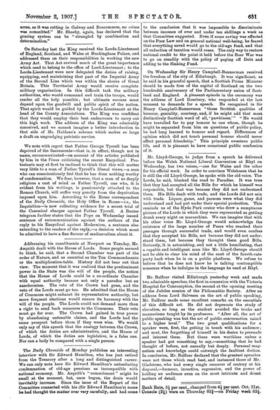Addressing his constituents at Newport on Tuesday, Mr. Asquith dealt
with the House of Lords. Some people seemed to think, he said, that a Second Chamber was part of the order of Nature, and as essential as the Ten Commandments or the multiplication-table. History did not bear out that view. The moment that it was realised that the predominant power in the State was the will of the people, the notion that the House of Lords could be a co-ordinate Chamber with equal authority became not only a paradox but an anachronism. The veto of the Crown had gone, and the veto of the Lords must go too. He admitted that the House of Commons might exhaust its representative authority, but more frequent elections would ensure its harmony with the will of the people. The Lords could not demand more than a right to send back measures to the Commons. Their veto must go for ever. The Crown had gained in true power by abandoning untenable claims, and the Lords had the same prospect before them if they were wise. We would only say of this speech that the analogy between the Crown, of which the duties are administrative, and the House of Lords, of which the duties are legislative, is a false one. Nor can a body be compared with a single person.






























































 Previous page
Previous page